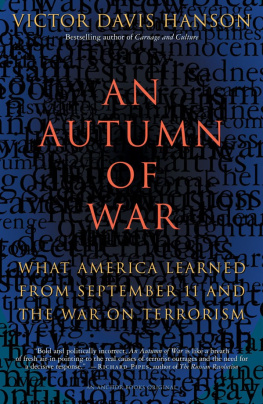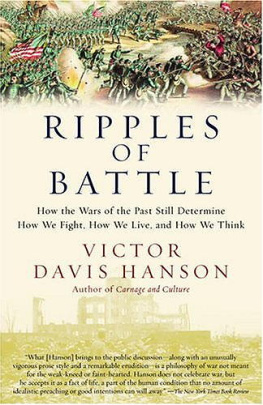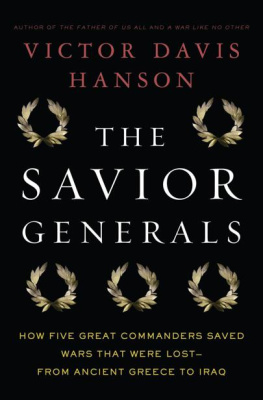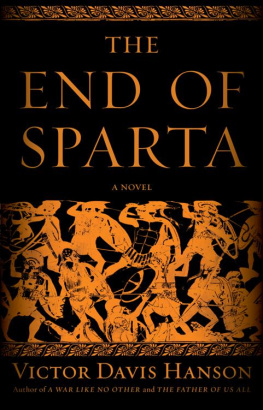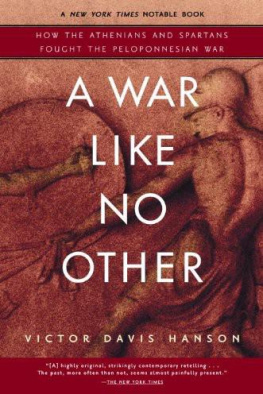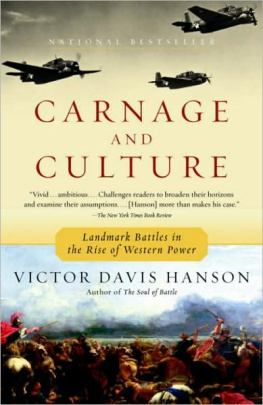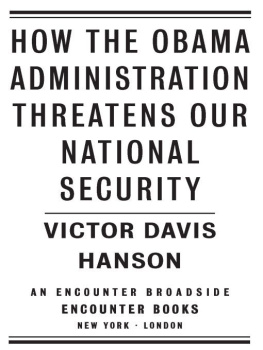Victor Davis Hanson - An Autumn of War - What America Learned From September 11 and the War on Terrorism
Here you can read online Victor Davis Hanson - An Autumn of War - What America Learned From September 11 and the War on Terrorism full text of the book (entire story) in english for free. Download pdf and epub, get meaning, cover and reviews about this ebook. year: 2002, publisher: Anchor / Random House, genre: Politics. Description of the work, (preface) as well as reviews are available. Best literature library LitArk.com created for fans of good reading and offers a wide selection of genres:
Romance novel
Science fiction
Adventure
Detective
Science
History
Home and family
Prose
Art
Politics
Computer
Non-fiction
Religion
Business
Children
Humor
Choose a favorite category and find really read worthwhile books. Enjoy immersion in the world of imagination, feel the emotions of the characters or learn something new for yourself, make an fascinating discovery.
- Book:An Autumn of War - What America Learned From September 11 and the War on Terrorism
- Author:
- Publisher:Anchor / Random House
- Genre:
- Year:2002
- Rating:4 / 5
- Favourites:Add to favourites
- Your mark:
- 80
- 1
- 2
- 3
- 4
- 5
An Autumn of War - What America Learned From September 11 and the War on Terrorism: summary, description and annotation
We offer to read an annotation, description, summary or preface (depends on what the author of the book "An Autumn of War - What America Learned From September 11 and the War on Terrorism" wrote himself). If you haven't found the necessary information about the book — write in the comments, we will try to find it.
Victor Davis Hanson: author's other books
Who wrote An Autumn of War - What America Learned From September 11 and the War on Terrorism? Find out the surname, the name of the author of the book and a list of all author's works by series.
An Autumn of War - What America Learned From September 11 and the War on Terrorism — read online for free the complete book (whole text) full work
Below is the text of the book, divided by pages. System saving the place of the last page read, allows you to conveniently read the book "An Autumn of War - What America Learned From September 11 and the War on Terrorism" online for free, without having to search again every time where you left off. Put a bookmark, and you can go to the page where you finished reading at any time.
Font size:
Interval:
Bookmark:

Table of Contents

VICTOR DAVIS HANSON
An Autumn of War
Victor Davis Hanson was educated at the University of California, Santa Cruz, and the American School of Classical Studies at Athens, and received his Ph.D. in Classics from Stanford University. He farmed full-time for five years before returning to academia in 1984 to initiate a Classics program at California State University, Fresno. Currently, he is Professor of Classics there and Coordinator of the Classical Studies Program.
Hanson has written articles, editorials, and reviews for the New York Times, Wall Street Journal, Daily Telegraph, International Herald Tribune, American Heritage, City Journal, American Spectator, National Review, Policy Review, The Wilson Quarterly, The Weekly Standard, and Washington Times, and has been interviewed on numerous occasions on National Public Radio and the BBC, and appeared with David Gergen on The NewsHour with Jim Lehrer. He writes a biweekly column about contemporary culture and military history for National Review Online .
He is also the author of some eighty scholarly articles, book reviews, and newspaper editorials on Greek, agrarian, and military history, and contemporary culture. He has written or edited eleven books, including The Western Way of War, The Soul of Battle, and Carnage and Culture .
He lives and works with his wife and three children on their forty-acre tree and vine farm near Selma, California, where he was born in 1953.
Also by VICTOR DAVIS HANSON
Warfare and Agriculture in Classical Greece
The Western Way of War: Infantry Battle in Classical Greece
Hoplites: The Ancient Greek Battle Experience (editor)
The Other Greeks: The Agrarian Roots of Western Civilization
Fields without Dreams: Defending the Agrarian Idea
Who Killed Homer? The Demise of Classical Education
and the Recovery of Greek Wisdom (with John Heath)
The Wars of the Ancient Greeks
The Soul of Battle: From Ancient Times to the Present Day,
How Three Great Liberators Vanquished Tyranny
The Land Was Everything: Letters from an American Farmer
Bonfire of the Humanities (with John Heath and Bruce Thornton)
Carnage and Culture: Landmark Battles in the Rise of Western Power
For Cara
Chronology of Events
September
9/11 Suicide bombing of the World Trade Center and Pentagon; some 3,000 killed
9/12 President Bush promises a monumental struggle of good and evil
9/18 Anthrax letters postmarked and sent to major media
9/19 Military issues orders for military deployment in Afghanistan
9/20 President Bush addresses a joint session of Congress; announces war on terror
9/21 Ex-Soviet generals predict that America cannot win in Afghanistan
9/24 President Bush moves to freeze terrorists asssets
9/28 Jesse Jackson changes plans and will not go to Afghanistan to mediate crisis
October
10/17 Alice Walker, Susan Sontag, and others voice criticism of American retaliation
10/6 Bush announces time is running out on Taliban to give up bin Laden
10/7 American aircraft begin bombing Taliban and al-Qaeda strongholds
10/9 Senator Daschles office receives anonymous anthrax letter
10/13 Al-Qaeda official promises more terrorist attacks on American skyscrapers
10/16 Secretary of State Powell offers to work with moderate Taliban
10/21 Taliban captures and executes opposition leader Abdul Haq
10/31 R. W. Apple in the New York Times compares Afghanistan to a Vietnam quagmire
November
11/1 Taliban spokesman warns that every Afghani has a rifle and will fight to the death
11/5 U.S. diplomat in Pakistan relates that Taliban feel they have the means to win
11/9 Sudden abandonment of Mazar-i-Sharif
11/11 Fall of western city of Herat
11/12 Three U.S. servicemen killed in accidental bombing at Kandahar
11/16 Mullah Omar rejects peace offers and vows to fight to death
11/17 Muslim holy month of Ramadan begins; bombing continues; fall of Kabul
11/23 Taliban give up Kunduz
11/25 Kunduz inmate uprising and killing of CIA agent; Marines land in Kandahar
11/27 American al-Qaeda member John Walker Lindh captured in Kunduz
December
12/1 Mullah Omar vows to fight for Kandahar until Judgment Day
12/2 Ten Israeli teens blown up in Jerusalem by suicide bombers; twenty-five during the week
12/5 Mullah Omar offers $50,000 for each dead Western journalist
12/7 Fall of Kandahar; Mullah Omar and bin Laden in hiding
12/13 Tape released of bin Laden lauding the terrorists attacks on 9/11
12/18 Organized resistance at Tora Bora caves ends; Americans begin search and destroy
12/19 Last fires at the wreckage of the World Trade Center are extinguished
12/22 Hamad Karzai forms new government of reconciliation in Afghanistan
Introduction: Why September 11 Wont Go Away
THE UNITED STATES was attacked at a time of peace on September 11, 2001. Islamic fundamentalistssponsored by the al-Qaeda organization, with the implicit support of the Taliban regime in Afghanistan, to the applause of thousands in the Middle East, and with the silence of millions moredestroyed the towers of the World Trade Center in New York City, severely damaged the Pentagon in Washington, crashed four jumbo jetliners in suicidal fury, and murdered nearly three thousand unsuspecting Americans. We shall never know the full extent of the initial planned attack, but it might have been far worse. Brave passengers on a Washington-bound jet seem to have overpowered the hijackers before they could destroy either the Capitol building or the White House. And the immediate arrest of hundreds of terrorist suspects in the days after September 11 probably prevented other subsequent operations.
On the afternoon of the attack, I began to compose several essays for a variety of newspapers and magazinesand thereafter wrote each day until the cessation of general hostilities in Afghanistan, the formation of a new government in Afghanistan, and the final extinction of the smoldering fires at Ground Zero in New York in late December. By that time the Taliban regime was thoroughly destroyed, the al-Qaeda terrorists had been either killed, captured, or scattered, and the United States was pondering its next season of war in its global counterattack against terrorism.
At the very outset, I was convinced that September 11 was a landmark event in American history, if not the most calamitous day in our nations 225 years. Not only did it represent the most grievous single-day foreign attack on the shores of the United States, but the bombings marked a far more climactic and devastating strike than all the prior precursors to American warsgreater in severity than Lexington and Concord, Fort Sumter, Havana Harbor, the sinking of the Lusitania, Pearl Harbor, and the Tonkin Gulf. The dead were for the most part civiliansslaughtered completely unaware at work or in transit. Their murderers were almost immediately canonized by many in the Middle East, and the architect of such evil was within hours greeted as a hero on the streets of the Islamic world. Four general consequences from the events of September 11 characterize these essays and provide themes for the book at large.
September 11 was not merely an act of terrorism per seisolated and disgruntled individuals of a small clique mad at the state of their world, and so taking out their frustrations against innocents in the United States. Rather, if al-Qaeda did not exist, it would have to have been invented to assuage the psychological wounds of hundreds of millions of Muslims who are without much consensual government, freedom, and material security. Bin Laden is the ultimate representation of Islams failure to come to grips with the dizzying and sometimes terrifying pace of globalization and the spread of popular Western culture. In that context September 11 must be seen as the opportunistic response of fundamentalists to funnel collective frustration against the United States, which for most of the world represents the epitome of Westernism and modernism all in one.
Font size:
Interval:
Bookmark:
Similar books «An Autumn of War - What America Learned From September 11 and the War on Terrorism»
Look at similar books to An Autumn of War - What America Learned From September 11 and the War on Terrorism. We have selected literature similar in name and meaning in the hope of providing readers with more options to find new, interesting, not yet read works.
Discussion, reviews of the book An Autumn of War - What America Learned From September 11 and the War on Terrorism and just readers' own opinions. Leave your comments, write what you think about the work, its meaning or the main characters. Specify what exactly you liked and what you didn't like, and why you think so.

